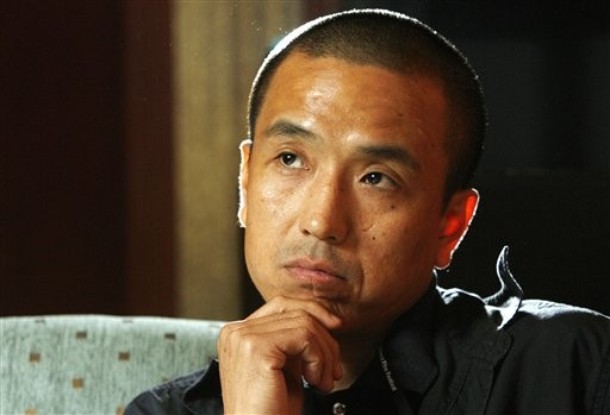Cannes challenges Beijing film censors By Andrew McCathie
 Cannes - Chinese director Lou Ye appears unperturbed about the reaction from Beijing to his latest movie, which delves into subjects the nation's heavy-handed censors prefer to keep out of the country's cinema.
Cannes - Chinese director Lou Ye appears unperturbed about the reaction from Beijing to his latest movie, which delves into subjects the nation's heavy-handed censors prefer to keep out of the country's cinema.
He shot the film despite an official ban on him making films.
Clandestinely filmed in the provincial Chinese metropolis of Nanjing, Lou's Spring Fever, which premiered at the Cannes Film Festival, is a movie about desire that revolves around a passionate affair between a married man and his more openly gay lover.
By portraying graphic gay lovemaking in his film, Lou directly confronts the rather prudish standards set by the Chinese authorities, who see homosexuality and sexual obsession as essentially taboo subjects for the nation's filmmakers.
"I hope that nothing will happen when I get back to China," Lou told a press conference Thursday marking the film's screening in Cannes. "I'm just a filmmaker. I always say: don't be afraid of the cinema."
Besides, Lou went on to say: "We always shoot in this way. Why? Because I try to focus on the film," he said.
More to the point, the screening of Spring Fever in Cannes represents the latest move by the world's leading movie festivals. In a sense, these new works lay down a challenge to the archaic world of China's film bureau by showing films the country has banned and celebrating their directors.
This includes directors such as Jia Zhangke, whose haunting and unsettling portrayals of life in modern China are not the type of movies that the Beijing authorities like to see representing their country at the world's top film festivals.
Jia's feature Still Life about the upheaval caused by China's Three Gorges Dam won the Venice Film Festival's celebrated Golden Lion three years ago.
That said, the result of the often uncompromising approach of the Beijing film authorities has been that several major movie talents have emerged from China's essentially underground cinema world to produce a new special brand of filmmaking.
"You get results that you never planned for and which you don't get in traditional filmmaking," said Lou's cameraman Florian J Zinke.
This is the third time that Shanghai-born Lou has joined the race for the Cannes festival's ionic and prestigious Palme d'Or.
However, about three years ago Lou found himself facing the wrath of Beijing's conservative film censorship board. The problem came when he submitted Summer Palace, another troubling movie for the Chinese authorities, to Cannes without receiving official permission.
This resulted in the authorities slapping a five-year ban on him making films in China.
Apart from vividly portraying sexual relationships, Summer Palace was a love story set against the backdrop of the 1989 Tiananmen Square uprising, which is another subject frowned upon by the Beijing Film Bureau.
Likewise, Lou's first film, Weekend Lover, was banned for two years. His film Suzhou River, which is about a man's obsession with a mysterious woman, is still banned by the Chinese authorities, despite winning international recognition for the 44-year-old director.
But in making Spring Fever, Lou insists that it was not his intention to make a film about the problems facing gays in China.
It is about the complexity of relationships, he said, with the married man discovering his wife has been paying an unemployed man to act as a sort of private detective to trail him and his gay lover.
The complex web of relationships widens as the gay lover becomes frustrated with the closeted married man's confusion and finds himself falling into a dalliance with the seemingly straight would-be private detective.
"It's not a film about homosexuality," Lou. "It's a film above love."
Like Lou, none of the actors in Spring Fever appeared too worried about any fallout from working with a banned director.
"I am an actor and only an actor," Qin Hao, who played the gay lover, told the Cannes press conference. "When I worked with Lou it was completely in accord with my ethics," he said.
But without any official distribution in China, Lou's latest film is only likely to reach an audience in mainland China via the nation's buoyant movie piracy industry.
"The pirate DVD is not my friend," said Lou. But if that is the only way Chinese audiences can see my film, then "it is a rather absurd situation," he said.
Lou is not critical of the movies that China pumps out each year under the watchful eye of the Beijing authorities.
"For me cinema is a pallet of colours," Lous said. If there is only one colour, he explains, filmmaking would be very boring. "(China's) studio films have their place in the pallet," he said.(dpa)